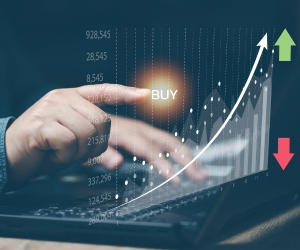DAX INDEX TRADING GUIDE
This guide delves into the essential aspects of trading the DAX, from understanding the index to exploring various trading strategies. Discover why the DAX is a cornerstone in many investment portfolios due to its diversification and liquidity benefits. Learn advanced techniques such as leverage, pair trading, and algorithmic trading to enhance your trading. We also cover essential tools and resources, including research platforms, educational materials, and trader communities that keep you informed and connected. Additionally, our guide emphasizes the importance of emotional control, robust risk management, and continuous learning to successfully navigate market complexities. Finally, we provide practical insights to guide you in creating a detailed trading plan and leveraging technology to refine your strategies. Dive in to equip yourself with the knowledge and tools needed for successful DAX trading.

How to Trade the DAX Index
The DAX (Deutscher Aktienindex) is Germany's main stock index and one of the most relevant in Europe. Composed of the 40 largest companies listed on the Frankfurt Stock Exchange, it includes industrial, technological, and financial giants. It is highly liquid and sensitive to European macroeconomic data, European Central Bank (ECB) decisions, and the evolution of the German economy.
Characteristics of DAX Trading
High Volatility: The DAX reacts strongly to economic news, ECB decisions, and political events in the Eurozone.
High Liquidity: It is one of the most liquid European indices, with tight spreads in futures markets and CFDs.
Correlation with Global Markets: It moves in line with Wall Street and other European indices like CAC 40 and FTSE 100.
Trading Hours: Available from European open to Wall Street close, with extended sessions in derivatives markets.
Instruments for Trading the DAX
DAX Futures: Traded on Eurex, they allow trading with leverage and high liquidity.
DAX CFDs: Widely used by retail traders for their flexibility and access to intraday movements.
DAX ETFs: Exchange-traded funds that replicate the index's behavior, ideal for long-term investors.
DAX Options: Used for hedging strategies and speculation based on volatility.
Trading Strategies for the DAX
1. European Opening Trade
The DAX experiences high volatility in the first hour of trading after the Frankfurt Stock Exchange opens. Effective strategies include:
Opening Breakout: Identify key levels in the first minutes and trade in the breakout direction.
Scalping: Take advantage of rapid initial movements with indicators like Bollinger Bands and RSI.
2. Trend Strategy
The DAX is an index with well-defined trending movements. Useful strategies include:
Moving Averages (50 and 200): Detect trend changes through bullish and bearish crossovers.
Price Channels: Identify entry and exit points within an established trend.
3. Pullbacks and Reversals
Pullbacks in strong trends often create trading opportunities. Recommended methods:
Fibonacci: Use Fibonacci retracements to identify entry zones after a correction.
RSI: Look for oversold or overbought conditions to spot reversals in extreme movements.
4. Correlations and Market Sentiment
The DAX is influenced by other assets and global markets, including:
EUR/USD: A strong euro can negatively affect the index as it makes German exports more expensive.
US Indices (S&P 500, Nasdaq): The DAX tends to move in line with Wall Street, especially in the second half of the day.
German Macroeconomic Data: GDP, manufacturing, and employment reports significantly impact the index.
Risk Management in DAX Trading
Strategic Stop-Loss: Since the DAX is volatile, place well-calculated stops to avoid premature exits.
Leverage Control: Avoid excessive leverage, especially during periods of high volatility.
Economic News Tracking: Stay alert to key ECB events and Eurozone data.
Execution Discipline: Avoid impulsive trading and adhere to a structured plan based on technical and fundamental analysis.
SWOT Analysis of the DAX as an Index
This SWOT analysis evaluates the DAX, Germany's main stock index, considering the strength of the German financial market and the European economy, as well as challenges from global volatility and political tensions.
Strengths:
Robust economy: Germany is Europe's strongest economy, and the DAX reflects the performance of its largest industrial and technological companies.
Infrastructure and transparency: A well-structured and regulated financial market ensures the index's liquidity and stability.
Weaknesses:
Exposure to the European economy: The DAX is sensitive to volatility in the eurozone and crises that may affect the region's economy.
Moderate growth: Low economic growth in Europe can limit the index's appreciation potential.
Opportunities:
Innovation and energy transition: Investment in clean technologies and innovation in the industrial sector can drive the growth of DAX companies.
Foreign investment: Germany's attractiveness as a business hub can attract global capital and strengthen the DAX.
Threats:
Global instability: International crises and trade tensions can affect the European economy and, thus, the DAX's performance.
Regulatory risks: Changes in fiscal and monetary policy in the EU can create market uncertainty.
What is an International Stock Broker?
An International Stock Broker is the entity (or platform) that allows you to buy and sell shares of companies listed on stock exchanges in various countries around the world. Unlike a local broker, its main focus is on providing access to global markets, such as the US, European, or Asian markets.
Why do we need an International Stock Broker?
Investing in international stocks can be an excellent way to diversify your portfolio, as it gives you the opportunity to participate in the growth of economies and sectors worldwide. However, operating in global markets is not as straightforward as operating in the local market: it requires specific knowledge, compliance with international regulations, and the use of advanced trading platforms.
An International Stock Broker brings all these investment opportunities together in one place and allows you to access different exchanges and trading conditions, in exchange for a commission.
Examples and comparisons:
There are several well-known International Stock Brokers, such as Interactive Brokers, eToro, TD Ameritrade, or Saxo Bank, among others. Each offers trading platforms with particular features and commissions that vary according to the service. Some stand out for providing market advice and analysis in various languages, while others may offer more competitive operational costs or social investment tools. These details allow you to choose the option that best suits your needs and investor profile.
Regulatory and security aspects
It's essential that the International Stock Broker you choose is regulated by recognized entities in the country where it operates, such as the U.S. Securities and Exchange Commission (SEC) in the United States, the Financial Conduct Authority (FCA) in the United Kingdom, or the Securities and Exchange Commission of Brazil (CVM), among others. This oversight ensures that the broker complies with strict security and transparency standards, providing you with more confidence when investing your money.
How do Brokers "connect" to International Markets?
Through agreements with foreign stock exchanges and the use of advanced technological platforms, International Stock Brokers process the buy and sell orders placed by their clients. They order the transactions according to price, order of arrival, and other parameters, charging a commission when the transaction is executed. This technological infrastructure allows operations to be carried out quickly and securely, facilitating real-time tracking of your investments.
In conclusion, an International Stock Broker is your gateway to the most important stock markets in the world. Thanks to its regulation, trading platforms, and knowledge of global markets, you can diversify your portfolio and seek growth opportunities in different sectors and countries.









